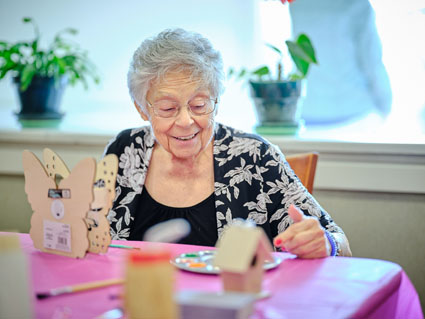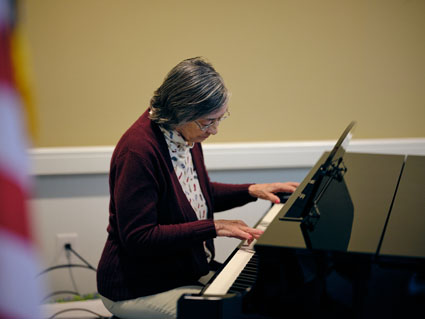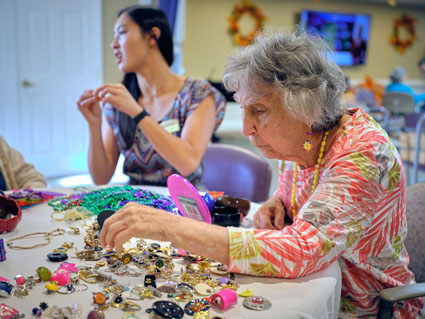Occasional forgetfulness is a natural part of the aging process. For example, misplacing keys or struggling to remember someone’s name from time to time is not necessarily a cause for concern, especially if you or your loved one are able to recall those things later. However, if memory lapses are frequent and they interfere with the ability to function in daily life, this could be a sign of Alzheimer’s disease or another form of dementia.
How to Recognize Early Signs of Dementia
 More than mere memory loss, a diagnosis of dementia usually means a person is experiencing two or more of these symptoms, and these impairments in communication, focus and reasoning have begun to affect everyday life.
More than mere memory loss, a diagnosis of dementia usually means a person is experiencing two or more of these symptoms, and these impairments in communication, focus and reasoning have begun to affect everyday life.
- Short-Term Memory Loss. Ability to remember events from years ago, but not where they were this morning.
- Difficulty Planning or Solving Problems. Inability to follow a plan, such as driving directions or a cooking recipe.
- Difficulty Performing Familiar Tasks. Struggling with routine activities done for years, such as balancing a checkbook, paying bills, even operating the TV or computer.
- Problems Speaking or Writing. Trouble following a conversation or finding the right words to express themselves. Spelling and handwriting may suffer.
- Changes in Mood or Personality. Someone who is normally shy may suddenly become outgoing, or a normally happy individual may become irritable and depressed.
- Loss of Interest in Hobbies & Socializing. No longer wanting to go out, avoiding family and friends, or expressing a disinterest in activities previously enjoyed.
- Repeating daily tasks, such as eating breakfast or shaving, or asking the same question after the answer was already provided.
- Poor Judgement or Decision-Making. Lack of hygiene or housekeeping, falling victim to email or phone scams, buying things they don’t need or overpaying for things they do.
- General Confusion. Misplacing items, missing appointments, forgetting where they are. Inability to judge time or to remember people they’ve met before.
- Struggling with Change. Craving routine, agitated when it’s disrupted. Fear of, or resistance to, new experiences or places.
When to See a Doctor
 If you or a loved one are experiencing two or more of the above symptoms, and they do not improve with R&R, it’s time to talk with a doctor. He or she will likely refer you to a neurologist who will perform a full exam of your physical and mental health, which may include memory and mental tests, a neurological exam, blood tests and brain imaging.
If you or a loved one are experiencing two or more of the above symptoms, and they do not improve with R&R, it’s time to talk with a doctor. He or she will likely refer you to a neurologist who will perform a full exam of your physical and mental health, which may include memory and mental tests, a neurological exam, blood tests and brain imaging.
The good news is that with early diagnosis and treatment, such as medications and cognitive therapy, mental function can be maintained and the progression of the disease slowed.
When to Consider Memory Care
Once dementia is diagnosed, you or your loved one may be able to live independently, or with family, for some time. So how do you know when more help is needed? We recommend reading When is the Right Time for Memory Care for an in-depth response to this common question, but, in general, the Alzheimer’s Association suggests that caregivers ask themselves the following questions to determine if it’s time to move a loved one into a memory care community.
- Is your loved one unsafe in their current home?
- Is your loved one’s health suffering?
- Are your loved one’s needs beyond your physical abilities?
- Are you becoming stressed, irritable or impatient?
- Would the structure and social interaction of a memory care community be beneficial?
What Does Memory Care Look Like
 Unlike an assisted living community, memory care communities have staff that are specially trained to care for people with Alzheimer’s disease and other forms of dementia. In addition to 24-hour staff and assistance with daily tasks, memory care communities provide activities and programs designed to support socialization and stimulate cognitive abilities. Most memory care centers also provide security to prevent wandering.
Unlike an assisted living community, memory care communities have staff that are specially trained to care for people with Alzheimer’s disease and other forms of dementia. In addition to 24-hour staff and assistance with daily tasks, memory care communities provide activities and programs designed to support socialization and stimulate cognitive abilities. Most memory care centers also provide security to prevent wandering.
Both the Eddy Hawthorne Ridge Memory Care Community in East Greenbush NY and the Majorie Doyle Rockwell Memory Care Center in Cohoes NY provide memory care in a warm, homelike environment, where dignity and independence come first. Here are some of the specialized services and amenities you can expect in our memory care communities.
- Dementia education and communication coaching for all staff
- Extensive programs supporting life enrichment and resident purpose
- Full-time activities staff with scheduled events and outings
- Flexible schedules to support lifelong patterns and preferences
- Secured residence with interior courtyards and outdoor garden pathways
- Assistance with activities of daily living (ADL’s)
- Medication management by 24-hour licensed nursing staff
- Full-service beauty/barber shop
- Physician, pharmacy, psychological and podiatry, PT/OT services available
- Quiet Care® Monitoring technology installed in all residents rooms, providing an additional level of safety and security
- Continuum of care throughout the St. Peter’s Health Partners Network
To learn more about our memory care communities near Albany NY, contact us or call (877) 748-3339 to speak directly with a senior living specialist and schedule a tour.

